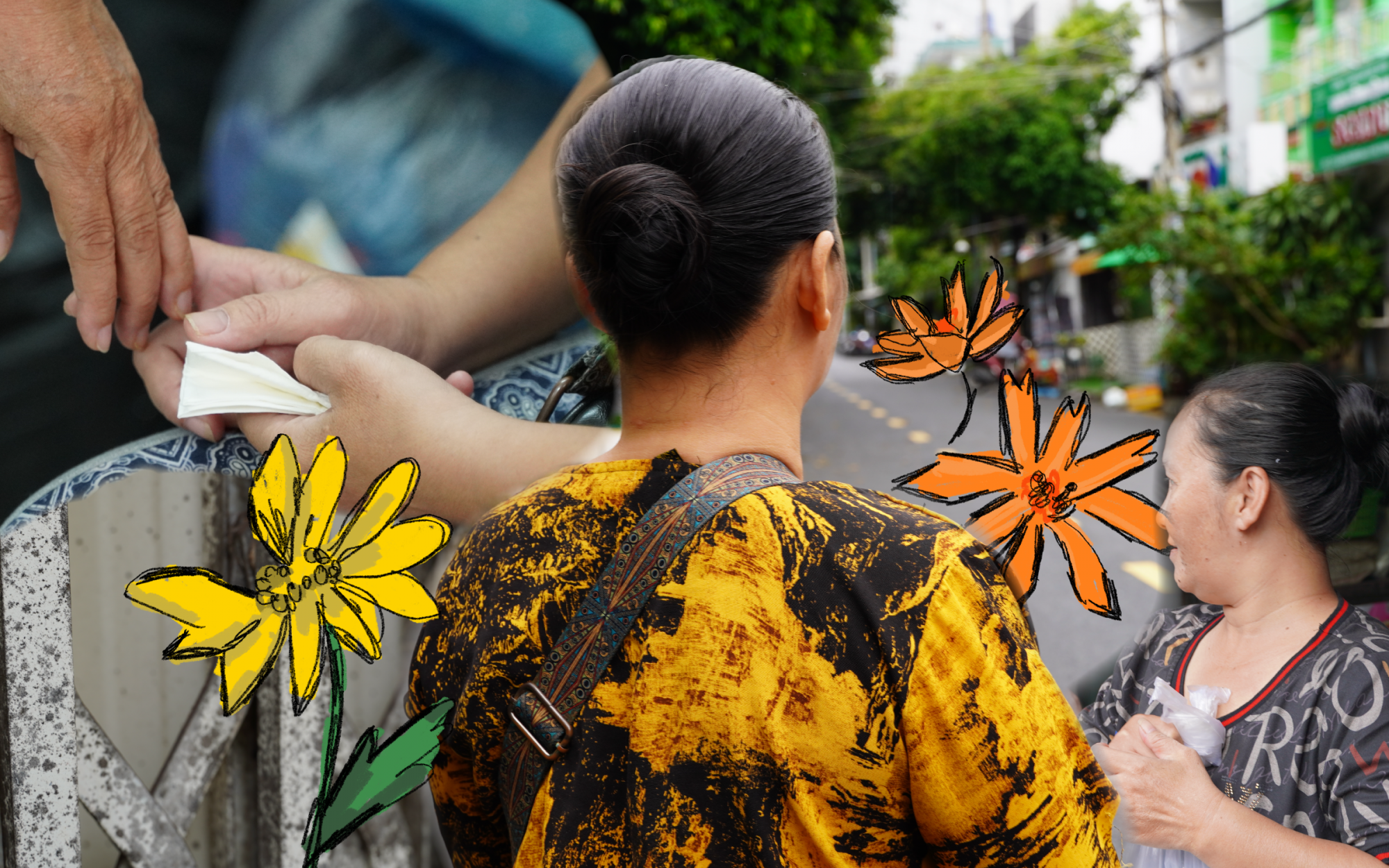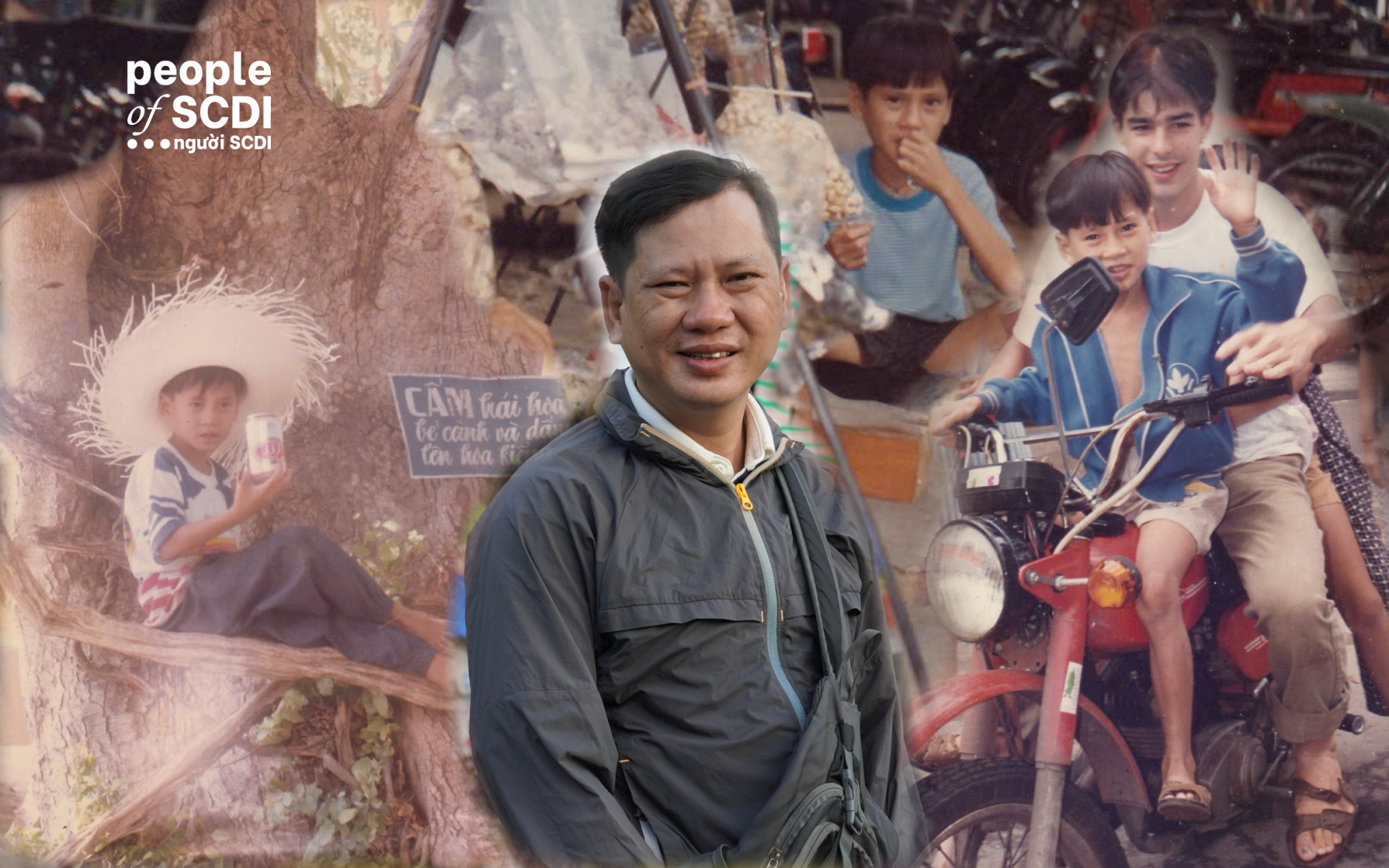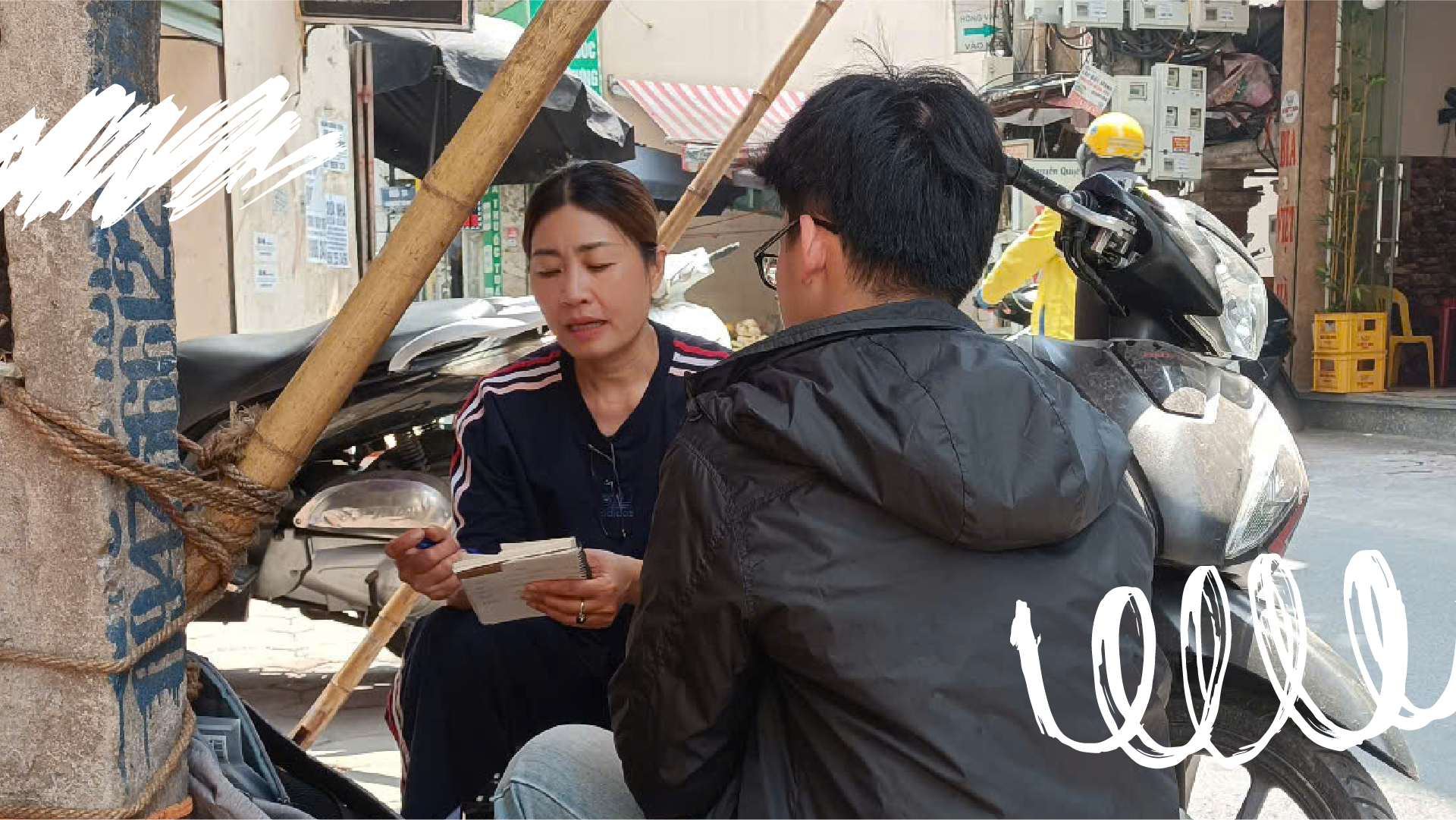Breaking the Cycle
We would like to share these small yet representative stories as a way of expressing our gratitude towards various collaborators, volunteers, donors, partners, and all the individuals, as well as organizations, who have walked alongside the Breaking the Cycle program team on our journey of bringing children to school and shared our firm belief that “Education is the most effective and sustainable path to break the cycle of poverty.” Every step of this journey has been sustained with your kindness and relentless collaboration, opening up the doors to a hopeful and promising future for the children we serve.
The Breaking the Cycle Team
The Breaking the Cycle Team

No one chooses to be born into the cycle of struggles. Yet for some, that’s where life begins. A childhood starved of care. Years of schooling lost. The weight of being a single parent, raising kids, while barely holding yourself together. And so the cycle carries on. It is passed down for generations, depriving kids, right from the moment they are born, of what should be the basics: to be cared for, to go to school just like their peers, or even just to be recognized as existing.
The Breaking the Cycle program began from those very concerns, at a time when the COVID-19 pandemic was amplifying existing vulnerabilities, with children bearing the heaviest impact. Driven by the firm belief that education can change lives, this journey has brought together many selfless, resilient, and dedicated individuals who fully commit themselves to the development of each child - all united by the same goal: to break the cycle of poverty, once and for all.
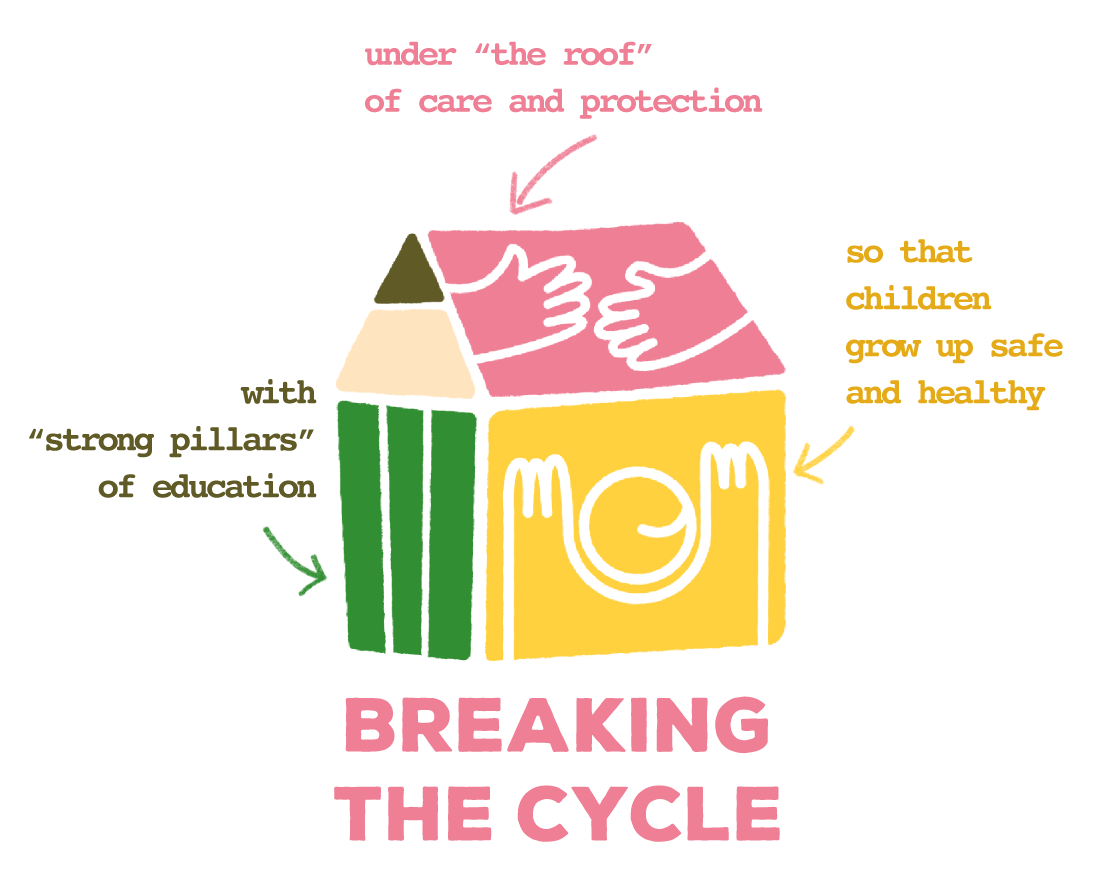
The Breaking the Cycle program began from those very concerns, at a time when the COVID-19 pandemic was amplifying existing vulnerabilities, with children bearing the heaviest impact. Driven by the firm belief that education can change lives, this journey has brought together many selfless, resilient, and dedicated individuals who fully commit themselves to the development of each child - all united by the same goal: to break the cycle of poverty, once and for all.

THE COMPANION
“This kid has not been able to go to school lately due to sickness; this kid was praised by the teachers at school for making progress; and this one can read and write now, but I’ll probably need to ask their parents to bring them over for some extra tutoring.” Knowing the names of each child in the Breaking the Cycle program like the back of her hand, for many years now, Mrs. Hoa has grown accustomed to remembering all the details about each family’s circumstance and each story of the children who were born disadvantaged.
Mrs. Hoa, who turned 64 this year, is a dedicated community officer of Hong Ha Ward, Hanoi. Her journey of helping people in need began so long ago that she can't even remember when. All she knows is that her desire to share her good fortune has been deeply rooted in her heart since she was young. She never hesitates to help in any way she can, as long as it's for someone who needs it.
Mrs. Hoa, who turned 64 this year, is a dedicated community officer of Hong Ha Ward, Hanoi. Her journey of helping people in need began so long ago that she can't even remember when. All she knows is that her desire to share her good fortune has been deeply rooted in her heart since she was young. She never hesitates to help in any way she can, as long as it's for someone who needs it.
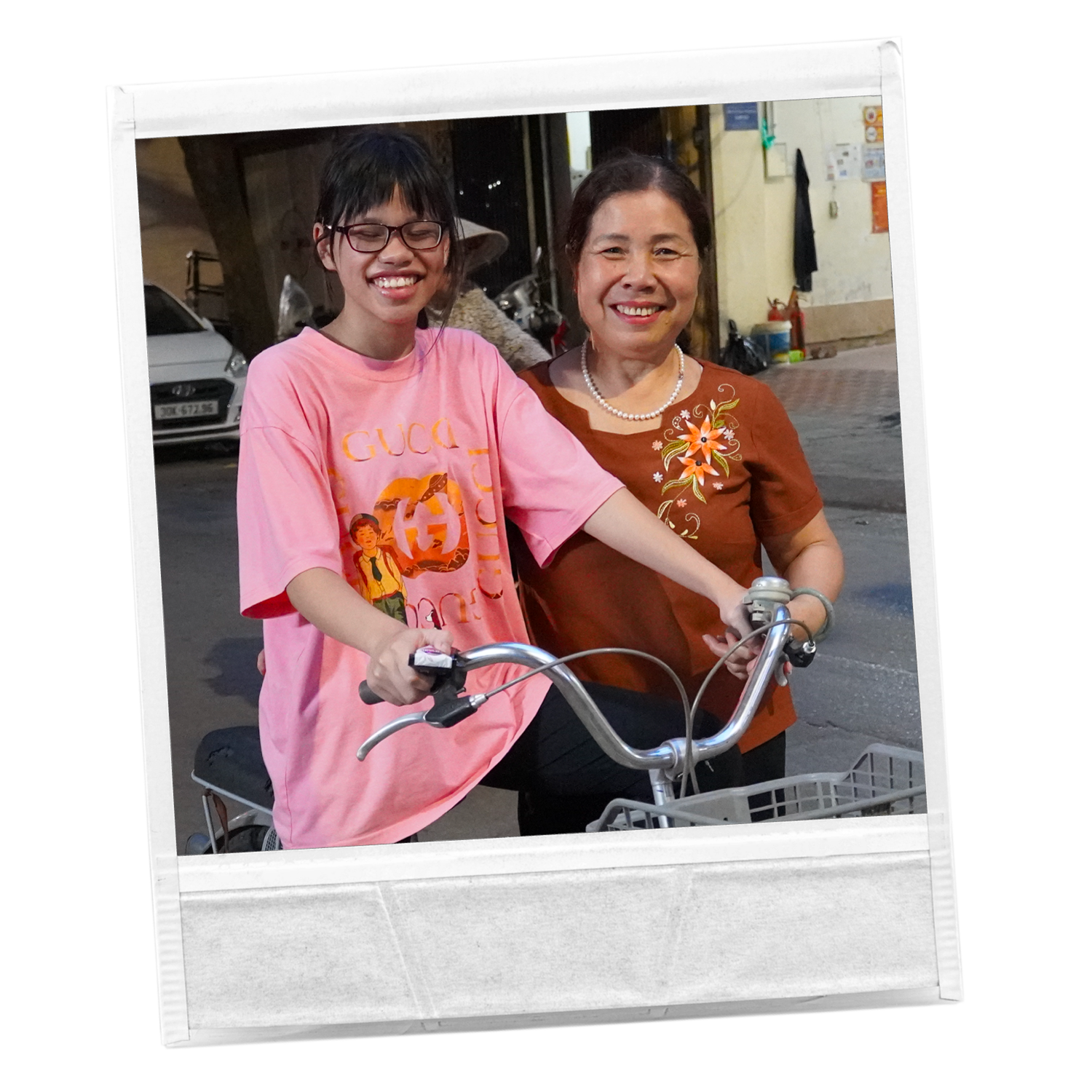
“When I was younger, I worked at the Women’s Union, so I’ve had the opportunity to carry out many vocational training and job creation programs for people in difficult situations. After retiring, I was elected Residential Group Leader, where I continue supporting families in need in my neighborhood.”
Hong Ha Ward was one of the areas placed under lockdown during Hanoi’s COVID-19 outbreak period. In an area where the population is mainly seasonal workers, social distancing also meant hunger. Undeterred by the pandemic, Mrs. Hoa went to every corner of the neighborhood, knocked on every door to gather information on struggling families, as well as those who hadn’t registered for temporary residence, making sure no one was left behind. That connection and dedication made her an indispensable member of SCDI’s community network, supporting with everything - from community tuberculosis screening, distributing hundreds of health insurance cards each year, to helping children in the Breaking the Cycle program go to and stay in school.
I’ve lived here for more than 30 years, but I was still shocked to find out just how many people in my neighborhood needed help…
“Many people in this area are migrants. They leave other provinces for Hanoi to make a living out of jobs like motorbike taxi drivers, cleaning, dishwashing, doing hourly domestic work,... Most are struggling, living meal to meal. When they’re just trying to make ends meet and put food on the table every day, for many of these families, their children’s education cannot be a top priority.”
“When Covid broke out, a whole stack of problems came with it. Many families lost their jobs, which means their only source of income was cut off. Back then, schools switched to online classes, but these families had no decent devices for their kids to learn from home. And just like that, the kids’ education was disrupted.”
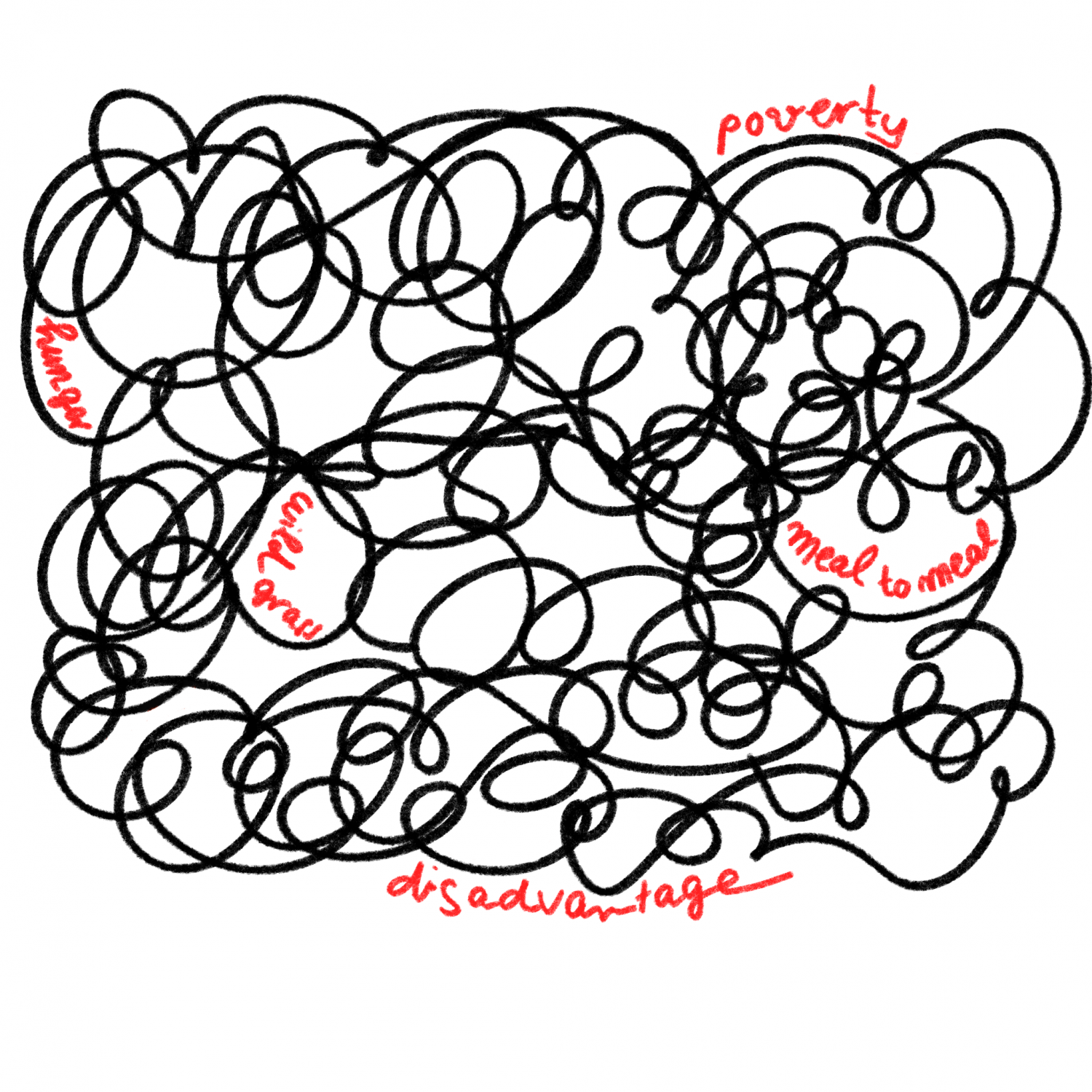
“When Covid broke out, a whole stack of problems came with it. Many families lost their jobs, which means their only source of income was cut off. Back then, schools switched to online classes, but these families had no decent devices for their kids to learn from home. And just like that, the kids’ education was disrupted.”

Many of them grew up like wild grass.
“These children lack the care from one or both of their parents from a young age. They often stayed with their grandparents or were taken in by their relatives. Many of them grew up like wild grass, without affection, attention, or guidance from adults. Some kids don’t even have any legal documents, since their parents don’t have any either. And the most apparent consequence of that is they don’t get to go to school like others.”
“But these kids didn’t do anything wrong; it’s not like they chose to be born into disadvantage. That's what makes me even more determined to try my best and support every child that I can.”
In the Breaking the Cycle program, Mrs. Hoa is a collaborator, directly supporting 30 children in the Bach Dang area (a part of Hong Ha Ward, Hanoi), where she is often affectionately referred to as “our Granny Hoa.”
Her house is always filled with children’s laughter, along with various school supplies, candies, milk, and sometimes even bicycles, which the program officers and kindhearted donors have brought there. One part of her living room is occupied with the donated items, and the other is used to set up a corner for the children to come and study. Many children’s houses are often cramped or unsuitable for studying due to being the same space where their parents or grandparents work to earn a living. Hence, every week, Mrs. Hoa’s house becomes the place where the program’s volunteers and the children meet up for their tutoring sessions.
“But these kids didn’t do anything wrong; it’s not like they chose to be born into disadvantage. That's what makes me even more determined to try my best and support every child that I can.”
In the Breaking the Cycle program, Mrs. Hoa is a collaborator, directly supporting 30 children in the Bach Dang area (a part of Hong Ha Ward, Hanoi), where she is often affectionately referred to as “our Granny Hoa.”
Her house is always filled with children’s laughter, along with various school supplies, candies, milk, and sometimes even bicycles, which the program officers and kindhearted donors have brought there. One part of her living room is occupied with the donated items, and the other is used to set up a corner for the children to come and study. Many children’s houses are often cramped or unsuitable for studying due to being the same space where their parents or grandparents work to earn a living. Hence, every week, Mrs. Hoa’s house becomes the place where the program’s volunteers and the children meet up for their tutoring sessions.
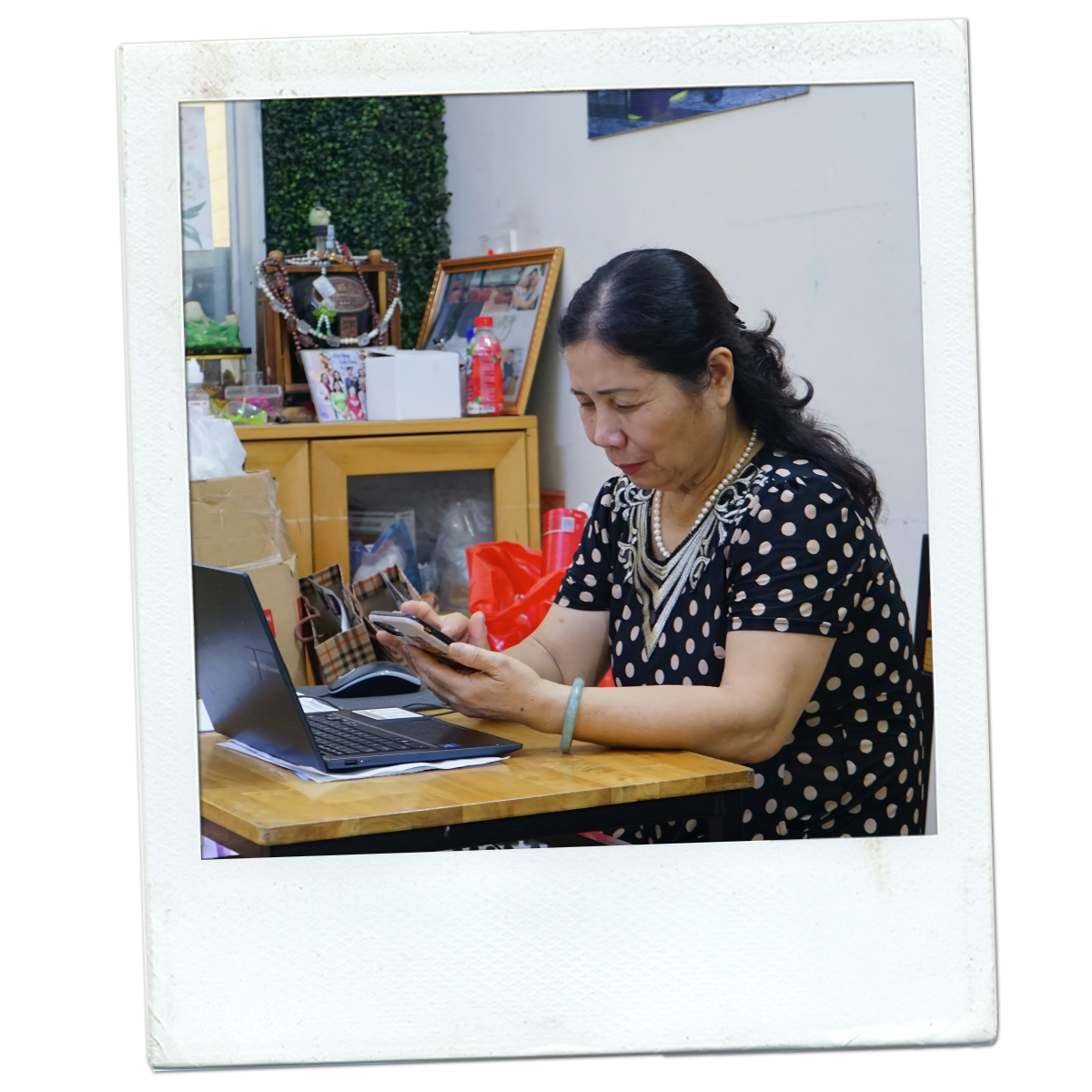
Although she retired, Mrs. Hoa is even busier than when she was still working. When she’s not visiting households to check on the children’s schooling, she would be at the ward office ‘borrowing’ the community center so the kids have a place to gather on weekends.
Mrs. Hoa also spends time learning new skills. She learns to use a laptop, to work with Excel spreadsheets to put together the lists of children who need support, and to keep track of each case. Even when she was away for her family matters, she still couldn’t help feeling restless and always thought of the kids back home.
She knows the situation of every child in the neighborhood like the back of her hand. “This kid was sick and missed a few days of school”, “That kid in vocational training gained 5 kilograms”, or “That family’s roof was blown off in the storm, so I came over to help them cover it up.” It is this deep connection with these families that makes Mrs. Hoa a vital link between the program and the community. “This family has children who need medical check-ups”, or “Both the mom and the child of this family still don’t have health insurance.” Many times, she would tell the program officers or partners, “If there are snacks or milk, please set some aside for me. I’ll also add some of my own to make the nutrition package we send to the children more substantial.”
Through monthly group activities, the children get to hang out with friends and gain access to a lot of crucial knowledge and skills. What might seem like simple things, like greetings, saying "thank you," or "I'm sorry", become essential lessons during each session. Along with that are many sessions with topics suitable for each age group, such as personal hygiene, self-protection, understanding emotions, and family relationships. These meetings don't just sow the seeds of positive values; they also nurture self-confidence and help the children grow step by step into young people who can find their place in society.
She knows the situation of every child in the neighborhood like the back of her hand. “This kid was sick and missed a few days of school”, “That kid in vocational training gained 5 kilograms”, or “That family’s roof was blown off in the storm, so I came over to help them cover it up.” It is this deep connection with these families that makes Mrs. Hoa a vital link between the program and the community. “This family has children who need medical check-ups”, or “Both the mom and the child of this family still don’t have health insurance.” Many times, she would tell the program officers or partners, “If there are snacks or milk, please set some aside for me. I’ll also add some of my own to make the nutrition package we send to the children more substantial.”
Through monthly group activities, the children get to hang out with friends and gain access to a lot of crucial knowledge and skills. What might seem like simple things, like greetings, saying "thank you," or "I'm sorry", become essential lessons during each session. Along with that are many sessions with topics suitable for each age group, such as personal hygiene, self-protection, understanding emotions, and family relationships. These meetings don't just sow the seeds of positive values; they also nurture self-confidence and help the children grow step by step into young people who can find their place in society.
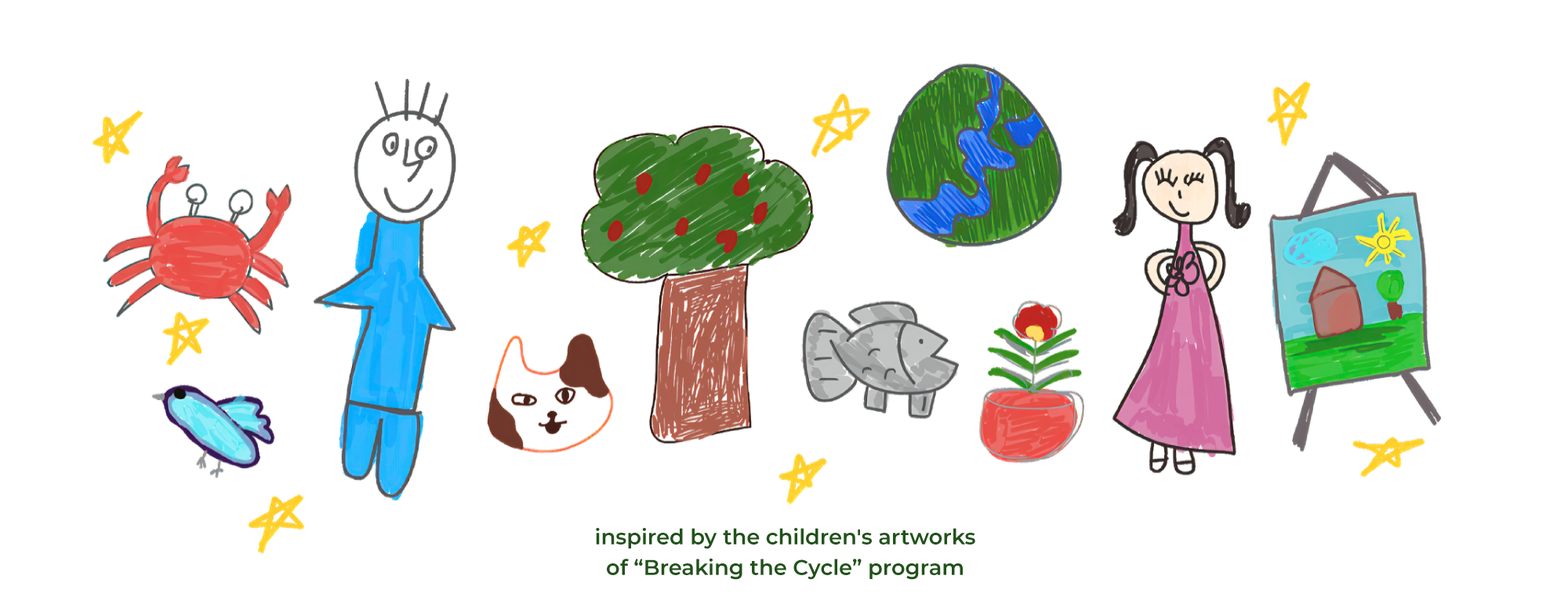
IT TAKES A VILLAGE TO RAISE A CHILD
All I know is they’re struggling, and their children don’t even have enough to eat. You need to understand why someone ends up in such a situation. Everyone has their own story, and I can’t judge them for it...
“I try to call them regularly, or visit their houses if they can’t be reached, just to check how they’ve been doing and encourage them. I need to help them understand the responsibility they need to take for their children, and for themselves.”
Change doesn’t just happen for those receiving support. It ripples out into the whole community, like water spreading downstream. More than once, Mrs. Hoa has faced skepticism for extending a hand to people society had turned its back on: “Why would you help people like that? Of all the people you could help, why'd you choose to stick with the ones who got off track?” To that, she simply replies, “All I know is they’re struggling, and their children don’t even have enough to eat. You need to understand why someone ends up in such a situation. Everyone has their own story, and I can’t judge them for it.”
To her, it’s not just about what you give, but also how you give it. These families, these children, who have endured so much hardship, often carry with them a deep sense of insecurity and shame. Gaining their trust is never easy, and opening their hearts takes time. But when met with respect and genuine care, they begin to change, slowly realizing they are seen, valued, and worthy of both opportunity and love.
Change doesn’t just happen for those receiving support. It ripples out into the whole community, like water spreading downstream. More than once, Mrs. Hoa has faced skepticism for extending a hand to people society had turned its back on: “Why would you help people like that? Of all the people you could help, why'd you choose to stick with the ones who got off track?” To that, she simply replies, “All I know is they’re struggling, and their children don’t even have enough to eat. You need to understand why someone ends up in such a situation. Everyone has their own story, and I can’t judge them for it.”
To her, it’s not just about what you give, but also how you give it. These families, these children, who have endured so much hardship, often carry with them a deep sense of insecurity and shame. Gaining their trust is never easy, and opening their hearts takes time. But when met with respect and genuine care, they begin to change, slowly realizing they are seen, valued, and worthy of both opportunity and love.

Photo (from left to right)
Mrs. Hoa, with program volunteers, guides children on how to use tablets donated by CellphoneS to bridge the learning gap during COVID-19 lockdowns.
Every time donations arrive from supporters, Mrs. Hoa lights up with joy, whether it’s clothes, toys, or even just a piece of sweets for the kids.
Despite injuries, the children’s “Granny Hoa” always shows up whenever they need her.
Mrs. Hoa, with program volunteers, guides children on how to use tablets donated by CellphoneS to bridge the learning gap during COVID-19 lockdowns.
Every time donations arrive from supporters, Mrs. Hoa lights up with joy, whether it’s clothes, toys, or even just a piece of sweets for the kids.
Despite injuries, the children’s “Granny Hoa” always shows up whenever they need her.
As long as the kids come over happy, the little ones even hugging me and kissing my cheek, that’s already enough of a reward for me.
When asked about the happy memories, Mrs. Hoa just laughed and said, "There are so many, I don’t even know where to begin." She shared just a few, like Kien and Xuyen, who once thought of dropping out to support their families but proudly enrolled in public universities in 2024. Or Huy Hoang, a boy who seemed to have fallen off track after his parents left, skipping school again and again. With Mrs. Hoa’s care and the program’s support, he was connected to vocational training at KOTO* and turned his life around. “Hoang was even honored as Student of the Year in 2024 at KOTO. Now he calls to check in on me, sends wishes for Women’s Day and Lunar New Year,” she smiled. Her joy comes from even the smallest positive changes in the children.
But the worries are still there, for Mrs. Hoa and for the entire program team. "This child has been sick and had to miss school for a long time. That one hasn't been able to get a birth certificate yet. Another child had to drop out to stay home and take care of a seriously ill father...”
There is still so much to be done for these children to truly have a sustainable future. But big changes need to start with small steps, from the hearts of people like Mrs. Hoa. So that from there, their efforts can spread to others who are still working quietly and diligently on a journey to nurture hope for disadvantaged children.
But the worries are still there, for Mrs. Hoa and for the entire program team. "This child has been sick and had to miss school for a long time. That one hasn't been able to get a birth certificate yet. Another child had to drop out to stay home and take care of a seriously ill father...”
There is still so much to be done for these children to truly have a sustainable future. But big changes need to start with small steps, from the hearts of people like Mrs. Hoa. So that from there, their efforts can spread to others who are still working quietly and diligently on a journey to nurture hope for disadvantaged children.
EDUCATION IS THE MOST EFFECTIVE PATH
OUT OF POVERTY
To ensure that children can attend and remain in school, we need a comprehensive support system - one that caters to their needs, from learning, health, and living environment to aspirations. Therefore, the Breaking the Cycle program is designed with multi-dimensional interventions tailored to specific needs, placing children at the very center of all efforts. Beyond providing tuition support, the program focuses on removing barriers that prevent children from accessing or sustaining their education - from identity documents and health insurance to essential needs such as nutrition, healthcare, learning conditions, and emotional encouragement.
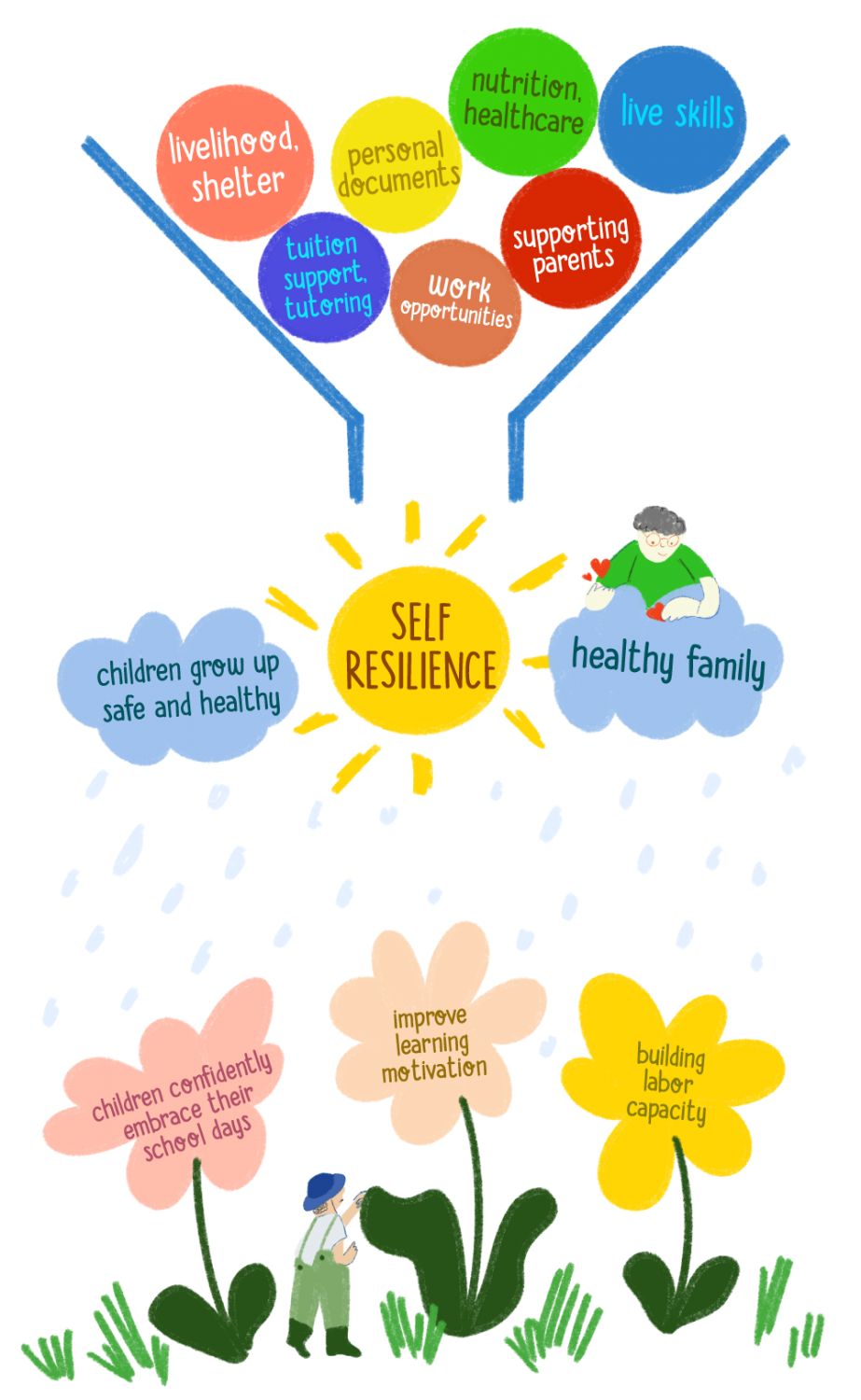
In 2024, 339 children received multi-dimensional support from the program, 287 of whom received tuition assistance for the 2024–2025 school year. Specific interventions were tailored to each implementation site, with partners working hand in hand towards a shared goal: to help children go to school and continue their education, while ensuring they stay safe, healthy, and hopeful for the future.
In Hanoi, the program has expanded its partnership with Hyundai Jump School to organize extracurricular activities and tutoring classes, helping children reinforce their knowledge. Additionally, the collaboration with VietHarvest provides nutritious meals for children and their families.
With the support of VinUniversity’s Doctor Residency Program, children receive health check-ups at home. At the same time, doctors help build children’s health records and detect underlying medical issues early, enabling timely intervention so their schooling is not disrupted for long.
In Hai Phong, the program has maintained a long-term collaboration with Tesa Site Hai Phong Co. Ltd. for the past two years, providing scholarships, nutritional support, and organizing group activities to help children develop life skills, as well as improve confidence and social integration.
In Ho Chi Minh City, the program team strives to connect with local donors, organizations, and businesses to expand support resources for children. The focus is on improving living conditions: from assistance with tuition fees and nutrition to group activities that allow children to play, learn soft skills, self-protection skills, and build their own dreams.
Changes have occurred, and hopes have found their way through hardship and difficulties, opening a new journey for children and their families. These changes did not happen overnight but were nurtured through perseverance, companionship, and the trust placed in the future of the children.

In 2024, 339 children received multi-dimensional support from the program, 287 of whom received tuition assistance for the 2024–2025 school year. Specific interventions were tailored to each implementation site, with partners working hand in hand towards a shared goal: to help children go to school and continue their education, while ensuring they stay safe, healthy, and hopeful for the future.
In Hanoi, the program has expanded its partnership with Hyundai Jump School to organize extracurricular activities and tutoring classes, helping children reinforce their knowledge. Additionally, the collaboration with VietHarvest provides nutritious meals for children and their families.
With the support of VinUniversity’s Doctor Residency Program, children receive health check-ups at home. At the same time, doctors help build children’s health records and detect underlying medical issues early, enabling timely intervention so their schooling is not disrupted for long.
In Hai Phong, the program has maintained a long-term collaboration with Tesa Site Hai Phong Co. Ltd. for the past two years, providing scholarships, nutritional support, and organizing group activities to help children develop life skills, as well as improve confidence and social integration.
In Ho Chi Minh City, the program team strives to connect with local donors, organizations, and businesses to expand support resources for children. The focus is on improving living conditions: from assistance with tuition fees and nutrition to group activities that allow children to play, learn soft skills, self-protection skills, and build their own dreams.
Changes have occurred, and hopes have found their way through hardship and difficulties, opening a new journey for children and their families. These changes did not happen overnight but were nurtured through perseverance, companionship, and the trust placed in the future of the children.
We’ll get through this together. You just focus on school, I’ll keep working. As long as you can stay in school, I’ll try to handle everything else…
Looking back on the past, Thuy, a mother of two children, Ngoc Lan and Bao Minh, cannot help but feel moved. Perhaps she never thought she could be this strong.
Her eldest, Ngoc Lan, is now in 8th grade. She lost a year of schooling when she had to drop out because the family could not afford tuition fees. Her younger brother, Bao Minh, who has a neurological disability, has just entered 1st grade at a school for children with disabilities.
The four-member family managed to get by with her father’s small income as a motorbike taxi driver, while Thuy took on any work she could find - washing dishes, cleaning, selling goods, anything that could help her earn money to support her children.
Her turbulent youth once left her astray, but when she became a mother, she knew she had to change. For her children, she began the journey of starting over.
Her eldest, Ngoc Lan, is now in 8th grade. She lost a year of schooling when she had to drop out because the family could not afford tuition fees. Her younger brother, Bao Minh, who has a neurological disability, has just entered 1st grade at a school for children with disabilities.
The four-member family managed to get by with her father’s small income as a motorbike taxi driver, while Thuy took on any work she could find - washing dishes, cleaning, selling goods, anything that could help her earn money to support her children.
Her turbulent youth once left her astray, but when she became a mother, she knew she had to change. For her children, she began the journey of starting over.


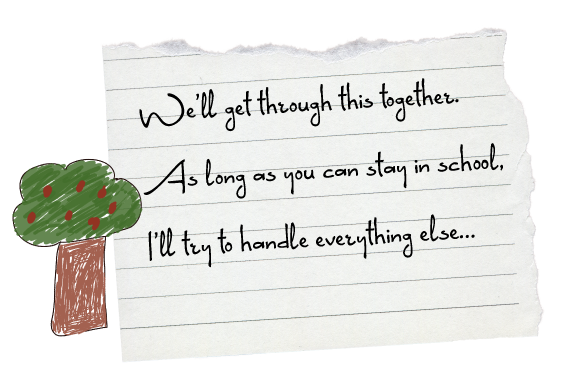
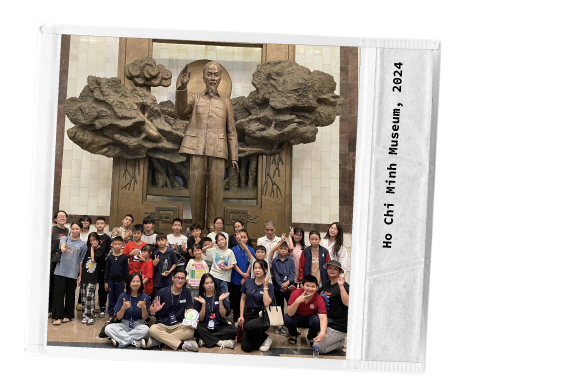
In 2024, the program stepped in to pay Ngoc Lan’s tuition, ensuring she could continue her education without further disruption. Meanwhile, Bao Minh received support for day-boarding fees, easing Thuy’s worries and freeing up more time for her work.
But the hardships didn’t stop there, when came the constant coughs that just wouldn’t go away. Unable to afford medical checkups, the mother and daughter bought over-the-counter medicine to get by. It wasn’t until the program staff took them for tests that they found out Ngoc Lan had active tuberculosis, requiring 15 days of hospitalization and six months of treatment. Thuy herself had latent tuberculosis and needed three months of treatment. The program immediately helped them get health insurance cards so both could receive proper care, while also providing supplements and nutrition to support their recovery. More importantly, it was the emotional support that helped Thuy feel less alone.
During treatment, Ngoc Lan had to miss school. To help her keep up with lessons, the program arranged for volunteer tutors. “Before, I was really afraid of Math, but with my tutor's help, it’s not so scary anymore. She explains things clearly, and now I understand better.”

Not only did her studies improve, but Ngoc Lan also became more cheerful and lively. “I like playing with my friends. My favorite was the day we made pottery. That day I even won a prize!”
It wasn’t just Ngoc Lan who learned; her mother, like many other parents in the program, also gained “lessons” - learning how to listen to her children, communicate with them, and become an empathetic companion on their growing journey.
But the hardships didn’t stop there, when came the constant coughs that just wouldn’t go away. Unable to afford medical checkups, the mother and daughter bought over-the-counter medicine to get by. It wasn’t until the program staff took them for tests that they found out Ngoc Lan had active tuberculosis, requiring 15 days of hospitalization and six months of treatment. Thuy herself had latent tuberculosis and needed three months of treatment. The program immediately helped them get health insurance cards so both could receive proper care, while also providing supplements and nutrition to support their recovery. More importantly, it was the emotional support that helped Thuy feel less alone.
During treatment, Ngoc Lan had to miss school. To help her keep up with lessons, the program arranged for volunteer tutors. “Before, I was really afraid of Math, but with my tutor's help, it’s not so scary anymore. She explains things clearly, and now I understand better.”

Not only did her studies improve, but Ngoc Lan also became more cheerful and lively. “I like playing with my friends. My favorite was the day we made pottery. That day I even won a prize!”
It wasn’t just Ngoc Lan who learned; her mother, like many other parents in the program, also gained “lessons” - learning how to listen to her children, communicate with them, and become an empathetic companion on their growing journey.
My burden has somewhat been eased. Without the program, I wouldn’t know where to turn to.
“I feel so blessed, like a guardian angel appeared, when the program came just in time to hold my family steady through hardship. Otherwise, even if I had to give my right arm, I would have done it, just so my children could stay in school.”
“Because only education can end suffering.” Thuy shares her simple hope, entrusting in her children the dream she once had to give up: “I just want them to finish middle and high school, then get a decent job. Just like the other kids in the program who are in vocational training and getting stable jobs. That’s all I wish for my children.”
“Because only education can end suffering.” Thuy shares her simple hope, entrusting in her children the dream she once had to give up: “I just want them to finish middle and high school, then get a decent job. Just like the other kids in the program who are in vocational training and getting stable jobs. That’s all I wish for my children.”
THE CHILDREN OF “BREAKING THE CYCLE”
In a small house now filled with the laughter of three children, few would believe that just two years ago, the five members of the family - Trang, her husband, and their children Tung Linh, Hieu Nghia, and Coca - were still living adrift along the Red River’s alluvial islet.
Life on the river was precarious and deprived in every way: no clean water, and electricity only came from a small rectangular solar panel barely bigger than three hand spans. In winter, the kids had to study by candlelight because there wasn’t enough power. Cramped, makeshift living conditions often caused the children to suffer from skin diseases. To get to school, they had to cross a long wooden plank connecting their floating house to the riverbank, then take muddy paths that often made them slip and fall.
Life on the river was precarious and deprived in every way: no clean water, and electricity only came from a small rectangular solar panel barely bigger than three hand spans. In winter, the kids had to study by candlelight because there wasn’t enough power. Cramped, makeshift living conditions often caused the children to suffer from skin diseases. To get to school, they had to cross a long wooden plank connecting their floating house to the riverbank, then take muddy paths that often made them slip and fall.
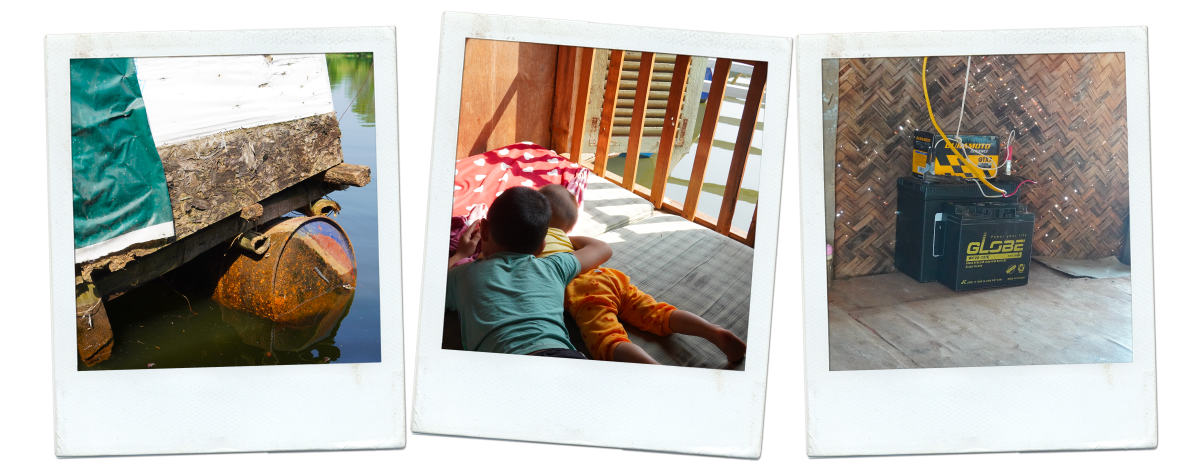
Photos (left to right)
Trang’s floating house, kept afloat by rusty metal barrels.
Tung Linh and Coca playing in a bedroom just an arm’s length from the water’s edge.
A single car battery, only enough to light a dim bulb
Trang’s floating house, kept afloat by rusty metal barrels.
Tung Linh and Coca playing in a bedroom just an arm’s length from the water’s edge.
A single car battery, only enough to light a dim bulb
Trang learned about the program during the last months of her pregnancy with Coca. At that point, she had nothing but 150,000 VND (about 6 USD) to prepare for giving birth. She had no prenatal check-ups, no nutritional supplements, no medicine. Thanks to timely support, program members arranged her very first prenatal exam, then covered delivery expenses, newborn supplies, and all the essentials for mother and child. When Coca was born healthy, the whole program team felt a huge sense of relief.
From then on, the three siblings became the children of “Breaking the Cycle”. The program walked alongside the family, helping them secure temporary residence documents, so that Tung Linh and Hieu Nghia could get formal education, as well as covering tuition, school supplies, health insurance, and medical expenses. Trang was also introduced to stable employment and provided health insurance.
Following the program’s recommendation, the couple made the decision to move onto land after more than 10 years drifting on the water. It wasn’t an easy choice, since it meant higher living costs and more worries. But Trang was determined: “Nothing is more important than safety and the future of our kids.”
In this "new life”, the children’s path to school is no longer far away, and they no longer have to hide where they live from their friends. Now, they excitedly invite friends over, study together, and even visit one another when sick. “For the first time, my kids have what might seem small to others, but to them it’s an entirely new world,” Trang shared.
From then on, the three siblings became the children of “Breaking the Cycle”. The program walked alongside the family, helping them secure temporary residence documents, so that Tung Linh and Hieu Nghia could get formal education, as well as covering tuition, school supplies, health insurance, and medical expenses. Trang was also introduced to stable employment and provided health insurance.
Following the program’s recommendation, the couple made the decision to move onto land after more than 10 years drifting on the water. It wasn’t an easy choice, since it meant higher living costs and more worries. But Trang was determined: “Nothing is more important than safety and the future of our kids.”
In this "new life”, the children’s path to school is no longer far away, and they no longer have to hide where they live from their friends. Now, they excitedly invite friends over, study together, and even visit one another when sick. “For the first time, my kids have what might seem small to others, but to them it’s an entirely new world,” Trang shared.
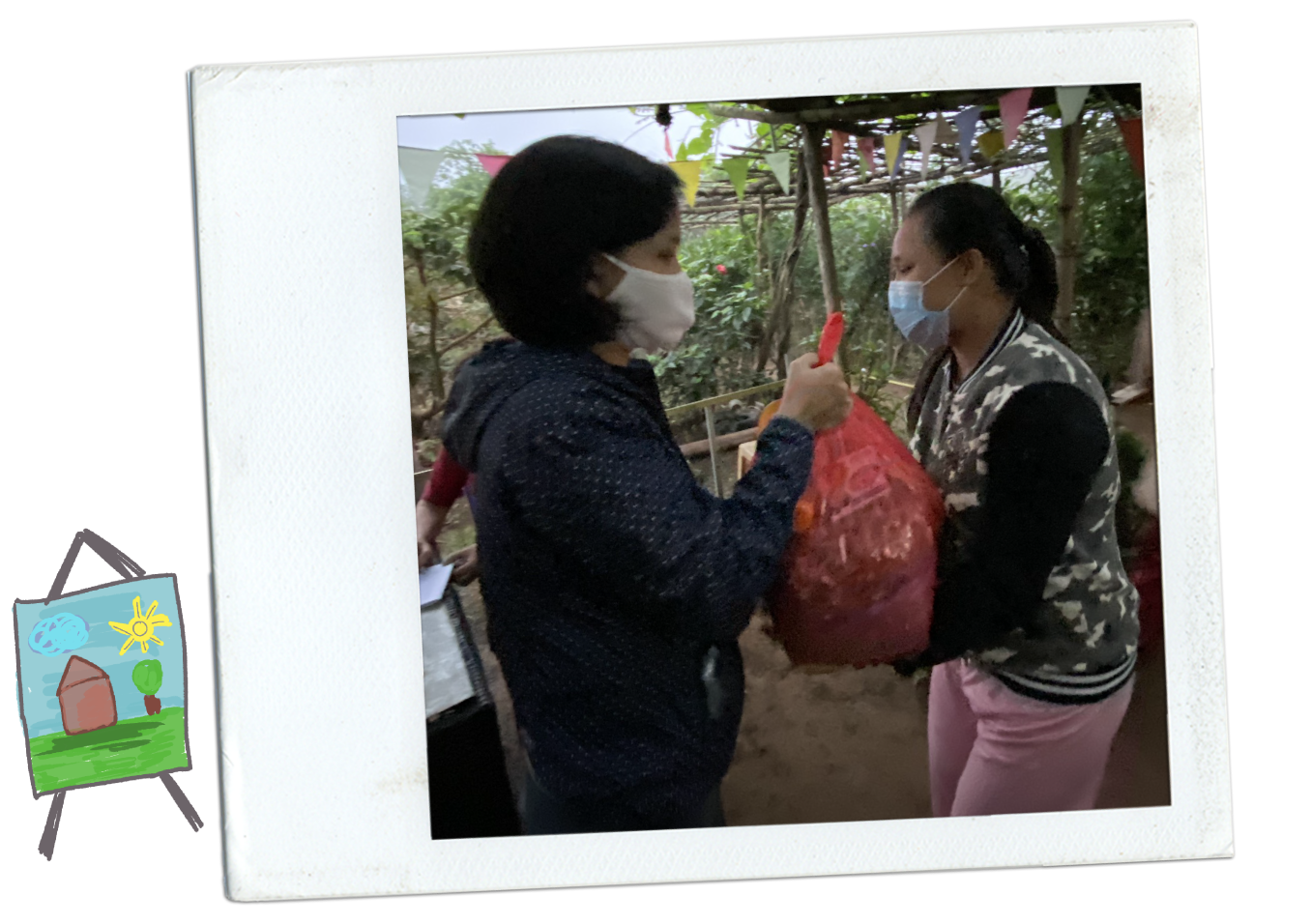

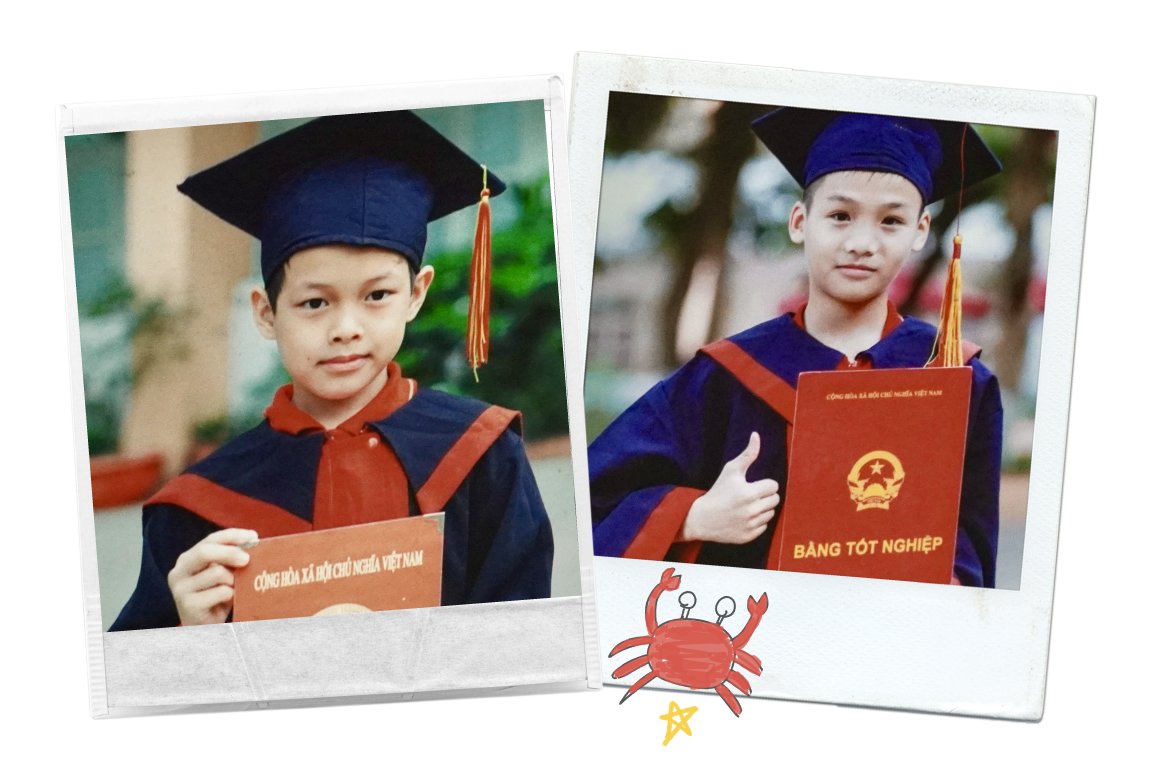
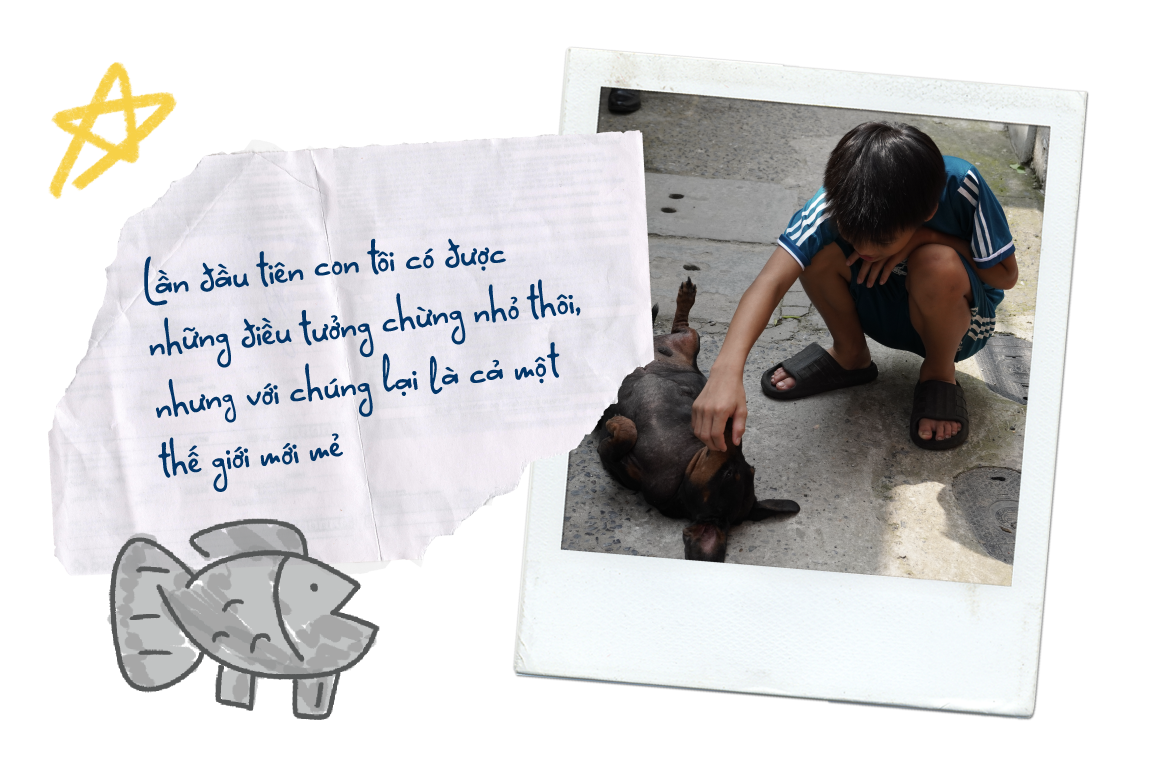
Photos (left to right, top to bottom)
SCDI met Trang’s family during the COVID-19 pandemic in early 2020, delivering food supplies.
Tung Linh and Hieu Nghia on the wooden plank linking their floating house to the riverbank.
The two brothers graduated from primary school in 2023 and 2024.
Tung Linh playing in an alley near the family’s rented “on land” home
SCDI met Trang’s family during the COVID-19 pandemic in early 2020, delivering food supplies.
Tung Linh and Hieu Nghia on the wooden plank linking their floating house to the riverbank.
The two brothers graduated from primary school in 2023 and 2024.
Tung Linh playing in an alley near the family’s rented “on land” home
The transformation lies not only in where they live, but also within themselves. Tung Linh and Hieu Nghia have become more confident and cheerful. Coca has grown lively and sociable, a true little “diplomat,” befriending neighbors with ease. Group activities, museum trips, and university visits organized by the program have helped the siblings open up, gain confidence, and grow up surrounded by love.
“It’s not just about the material support. What really means the most to me is having people by my side, feeling respected and listened to.” Looking back, Trang reflected: “Without that support, my family would still be drifting on the Red River.”
“I can’t say everything will be easy, as Coca is also about to start first grade, but when I look at my children, I feel more reassured.”
“It’s not just about the material support. What really means the most to me is having people by my side, feeling respected and listened to.” Looking back, Trang reflected: “Without that support, my family would still be drifting on the Red River.”
“I can’t say everything will be easy, as Coca is also about to start first grade, but when I look at my children, I feel more reassured.”
Knowing that there are people walking alongside us gives me one more reason to keep trying. Because if I don’t, everything would just stop here.
The changes in the lives of Trang’s family, Thuy’s family, and children like Tung Linh, Hieu Nghia, and Ngoc Lan, as well as many others, would not have been possible without the quiet yet steadfast companionship of dedicated individuals: Mrs. Hoa and program staff, volunteers, and the many silent supporters who are always ready to reach out a hand.
As reflected in the name “Breaking the Cycle”, the mission is not only to end the cycle of poverty, but also the cycle of shame, helplessness, and hidden wounds passed down through generations. When children are placed at the center of every effort, and when they can learn in a safe environment with access to healthcare, nutrition, and emotional support, then breaking the cycle is no longer a distant dream.
This journey cannot continue without more helping hands, compassionate hearts, and shared support. We believe that kindness, when nurtured with faith and perseverance, can create miracles. And every child, no matter their circumstances, deserves to grow up in a gentler, more inclusive, and loving world.
As reflected in the name “Breaking the Cycle”, the mission is not only to end the cycle of poverty, but also the cycle of shame, helplessness, and hidden wounds passed down through generations. When children are placed at the center of every effort, and when they can learn in a safe environment with access to healthcare, nutrition, and emotional support, then breaking the cycle is no longer a distant dream.
This journey cannot continue without more helping hands, compassionate hearts, and shared support. We believe that kindness, when nurtured with faith and perseverance, can create miracles. And every child, no matter their circumstances, deserves to grow up in a gentler, more inclusive, and loving world.
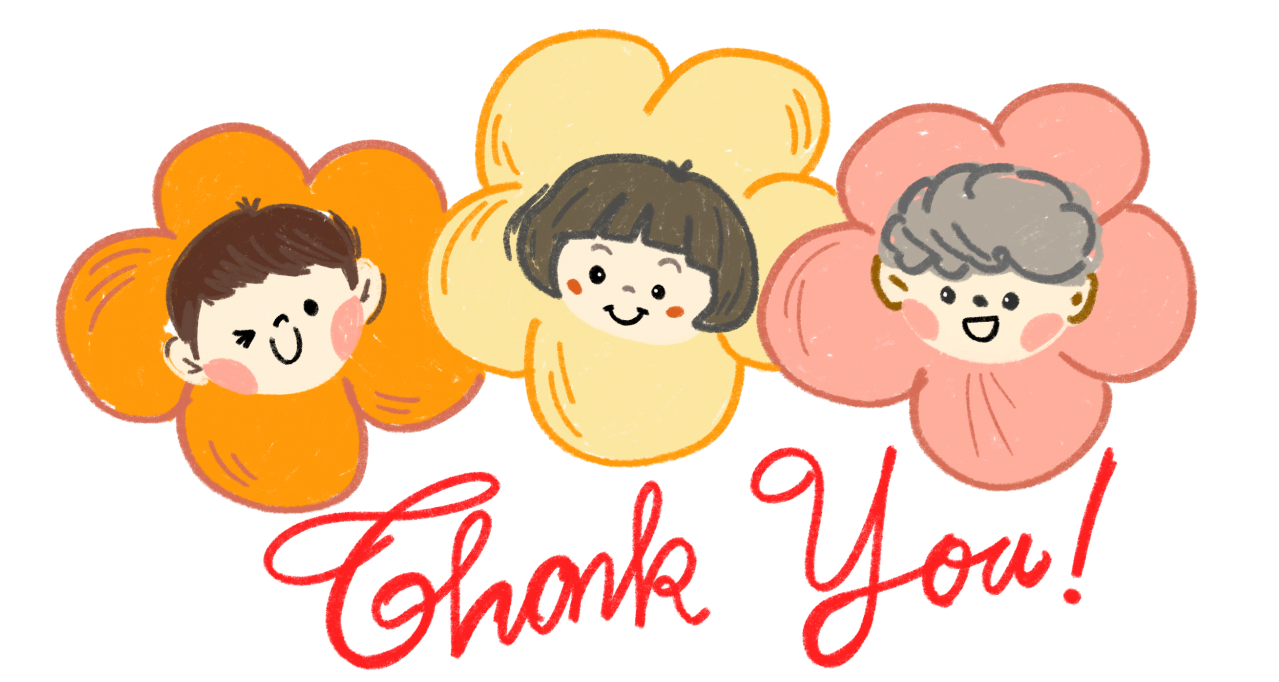 We would like to extend our deepest gratitude to our sponsors: World Bank, HSBC, the Embassy of Switzerland in Vietnam, tesa site Hai Phong Co., Ltd., the British International School Hanoi (BIS), Mckinsey, CellphoneS, Shopee Vienam, as well as our generous donors and media partners who have trusted and walked alongside us, spreading care, love, and bringing new opportunities to children and their families.
We would like to extend our deepest gratitude to our sponsors: World Bank, HSBC, the Embassy of Switzerland in Vietnam, tesa site Hai Phong Co., Ltd., the British International School Hanoi (BIS), Mckinsey, CellphoneS, Shopee Vienam, as well as our generous donors and media partners who have trusted and walked alongside us, spreading care, love, and bringing new opportunities to children and their families.We also sincerely thank our partner organizations and enterprises who have worked with Breaking the Cycle to deliver comprehensive and sustainable interventions for the children:
VinUni Residency Program
In collaboration with Breaking the Cycle, the program has supported children’s healthcare through early detection of health issues, building medical records, and organizing group sessions on health protection. These interventions help children avoid long absences from school and ease part of the burden on their families.
KOTO (Know One, Teach One)
A social enterprise established in 1999 with the mission of empowering disadvantaged youth through hospitality training in a professional environment. Graduates of KOTO are equipped with the skills needed to work in high-quality restaurants and hotels. Breaking the Cycle connects young people aged 18 and above to KOTO’s vocational training programs - an important step in expanding access to education and career opportunities, paving the way for a more sustainable future.
Hyundai Jump School
An education volunteer program for university students sponsored by Hyundai. In 2024, volunteers from the program worked with Breaking the Cycle to plan and organize many extracurricular activities, group sessions, and tutoring, creating meaningful and effective learning experiences for children.
Viet Harvest
A social enterprise established in 2020 that rescues quality surplus food and redistributes it to disadvantaged communities in Vietnam. In 2024, Viet Harvest supported the program with food packages, providing not only nutrition but also encouragement for children and their families.
Content: Anh Cao
Editing, design, and illustration: Hùng Nguyễn
Feature report: Lao Động Newspaper (Reporters Hoàng Thị Xuyến, Đặng Việt Anh)
Photos: Mai Đỗ, Hà Trịnh
Copyright © 2025, Center for Supporting Community Development Initiatives (SCDI).

